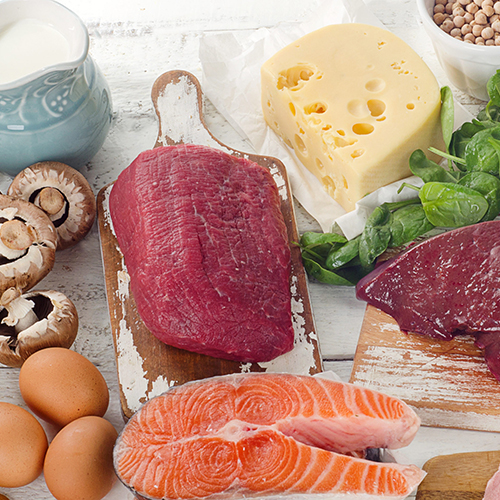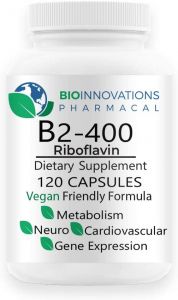Vitamin B2
Vitamin B2 is riboflavin. It can be found in a variety of plant and animal-based foods, such as milk, meat, eggs, nuts, enriched flour, and green vegetables.

Vitamin B2
Vitamin B2 is riboflavin. It can be found in a variety of plant and animal-based foods, such as milk, meat, eggs, nuts, enriched flour, and green vegetables.
Overview
Because vitamin B2 is a water-soluble vitamin, it dissolves in it. Every vitamin is either water or fat-soluble. Water-soluble vitamins are carried through the bloodstream, and any excess is excreted in the urine.
People must consume vitamin B2 on a daily basis because the body can only store a limited amount and supplies deplete quickly.
Riboflavin is found naturally in some foods, is added to others, and can be supplemented. The vast majority of it is absorbed in the small intestine.
Source of Vitamin B2
Vitamin B2 Sources
Food is the source of vitamin B2.
B2 can be obtained from a variety of sources, including:
- Fish, meat, and poultry, such as turkey, chicken, beef, kidneys, and liver
- Eggs
- Dairy products
- Asparagus
- Artichokes
- Avocados
- Cayenne
- Currants
- Fortified cereals
- Kelp
- Lima beans, navy beans, and peas
- Molasses
- Mushrooms
- Nuts
- Parsley
- Pumpkins
- Rosehips
- Sage
- Sweet potatoes
- Cruciferous vegetables, such as broccoli, Brussels sprouts, spinach, dandelion greens, and watercress
- Whole-grain bread, enriched bread, and wheat bran
- Yeast extract
Because vitamin B2 is water-soluble, it can be lost during cooking. Boiling loses approximately twice as much B2 as steaming or microwaving.
Uses & effectiveness of Vitamin B2
It is useful for:
- A lack of riboflavin (ariboflavinosis). Riboflavin taken orally can raise riboflavin levels in the body, aiding in the treatment and prevention of riboflavin deficiency.
Possibly useful for:
- Homocysteine levels in the blood are elevated (hyperhomocysteinemia). In some people with a specific gene type, taking riboflavin orally for 12 weeks reduces homocysteine levels by up to 40%.
- Migraine. Taking high-dose riboflavin orally appears to reduce the frequency and severity of migraine headaches in adults. It’s unclear whether it benefits children.
There is some interest in using riboflavin for a variety of other purposes, but there isn’t enough reliable data to say whether it will be beneficial.
Side Effects of Vitamin B2
Riboflavin is likely safe for most people in doses of up to 400 mg daily when taken orally. Riboflavin can cause urine to turn a bright yellow colour in some people. It may also make you feel nauseous. Overdoes are unlikely because the body can absorb up to 27 milligrammes of riboflavin and excretes any excess in the urine.
However, it is critical to consult with a doctor before taking any supplements, especially since they can interact with other medications.
Supplements can interact with other medications, and B2 supplements may reduce the effectiveness of some medications, such as anticholinergics and tetracycline.
A doctor may recommend supplementation if a patient is taking a medication that may interfere with riboflavin absorption.
Among the medications that may interfere with riboflavin levels in the body are:
- Tricyclic antidepressants, such as imipramine, or Tofranil
- Some antipsychotic drugs, such as chlorpromazine, or Thorazine
- Methotrexate, used for cancer and autoimmune diseases, such as rheumatoid arthritis
- Phenytoin, or Dilantin, used to control seizures
- Probenecid, for gout
- Thiazide diuretics, or water pills
Doxorubicin, a cancer treatment drug, may deplete riboflavin levels, and riboflavin may affect how doxorubicin works.
If you get any side effects, talk to your doctor, pharmacist or nurse. This includes any possible side effects not listed on this page. In the UK you can also report side effects directly to the Yellow Card Scheme By reporting side effects you can help provide vital information on the safety of this medical supplement.
Is this medicine suitable for you?
Take precautions:
- Pregnant and breastfeeding. When consumed in amounts found in foods, riboflavin is most likely safe. During pregnancy, 1.4 mg daily is recommended, and 1.6 mg daily during lactation.
- Children. When consumed in amounts commonly found in foods, riboflavin is likely safe for most children. Higher doses of 100-200 mg per day have also been used safely.
- Liver disease. In people with liver disease, riboflavin absorption is reduced.
Consult your doctor
Dosage of Vitamin B2
Your daily diet should provide you with all of the riboflavin you require.
Riboflavin cannot be stored in the body, so it must be consumed on a daily basis.




